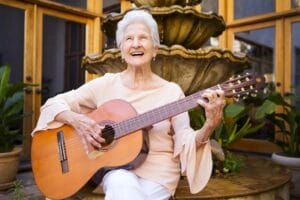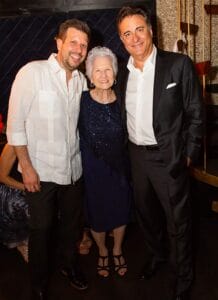Alvarez lived what most would consider an ordinary life. Born in Cuba, she enjoyed music, and started to write her own songs at 12. But neither her father, nor later her husband, thought that being a performer was suitable for her, so she put her dreams aside. In 1962 the couple decided to flee the rule of Fidel Castro, but found that difficult. Angela showed up at the airport with her four children, 3 boys and a girl aged 4–15, but she wasn’t allowed to board with them: the children were taken away to an orphanage in Pueblo, Colo. She was allowed to follow three years later by getting a job at a bank in Pueblo as a janitor, and only then was she able to retrieve her children. Her husband’s route was more difficult: he went to Mexico, Texas, Florida, Louisiana, Puerto Rico, Guatemala, and El Salvador; the family finally reunited when he got a good job in Baton Rouge, La., as a mechanical engineer in a sugar mill in 1972. Angela switched to cleaning houses. And on the side, she continued to write songs. “Always I have pencil and paper, and when I have inspiration or remember something, I can’t stop it,” she said in 2023. “It comes very easy. When I’m finished, I sing it, and that’s the song.”

But she rarely sang, at least in public. “You sing for the family,” her father had told her, “but not for the world.” But in 1977 her husband died of cancer, and she sang one favorite song, “María”, at their daughter’s wedding. Good thing, because in 1999 her daughter also died of cancer. “She had always pushed me to follow my musical dreams,” said her grandson, Carlos José Alvarez. He became a composer and producer. Once he was established, he came back to Baton Rouge on a mission: he wanted to record his grandmother playing and singing her songs. They had about 50 completed pieces to choose from. “These songs had become a diary of her life,” Carlos said. “She sang me all of the songs and told me what they were about. I was just kind of emotionally blown away by the whole thing.” They chose 15, enough for a full album, including “María” (included below). “Today, we write music to make it sound like it’s from a certain era,” Carlos said. “These songs were from her era, written in the harmonic, melodic vocabulary of the world that she grew up in. This was who she was meant to be.”
When Carlos’s friend Misha’al Al-Omar, heard the songs, he pushed Carlos to be professional in creating the album, and agreed to be a co-producer. They hired other musicians to provide accompaniment, and the album was released in 2021. Carlos submitted it to the Latin Grammy Awards, and took her to the ceremony in Las Vegas. When the winner of Best New Artist was announced, Angela said, she cried out, “Carlos, that’s me!” She couldn’t believe it, she said later. The award was actually a tie, with Silvana Estrada …who was only 25. At 95, Angela set the record as the oldest performer to win the Latin Grammy Award for best new artist.

That wasn’t the end of the magic for Angela. In 2021, Cuban-born actor Andy Garcia narrated — and co-produced — a documentary of her life story, Miss Angela. In 2022, Garcia brought her in when he starred in a remake of Father of the Bride, where she performed her song “Quiéreme Mucho” (“Love Me Very Much”) for a scene. In accepting her Grammy, Angela told the audience, “Although life is difficult, there is always a way out, and with faith and love you can achieve it, I promise you. It’s never too late.” Angela died December 6 at the home she moved to with her husband in 1972. She was 97.
